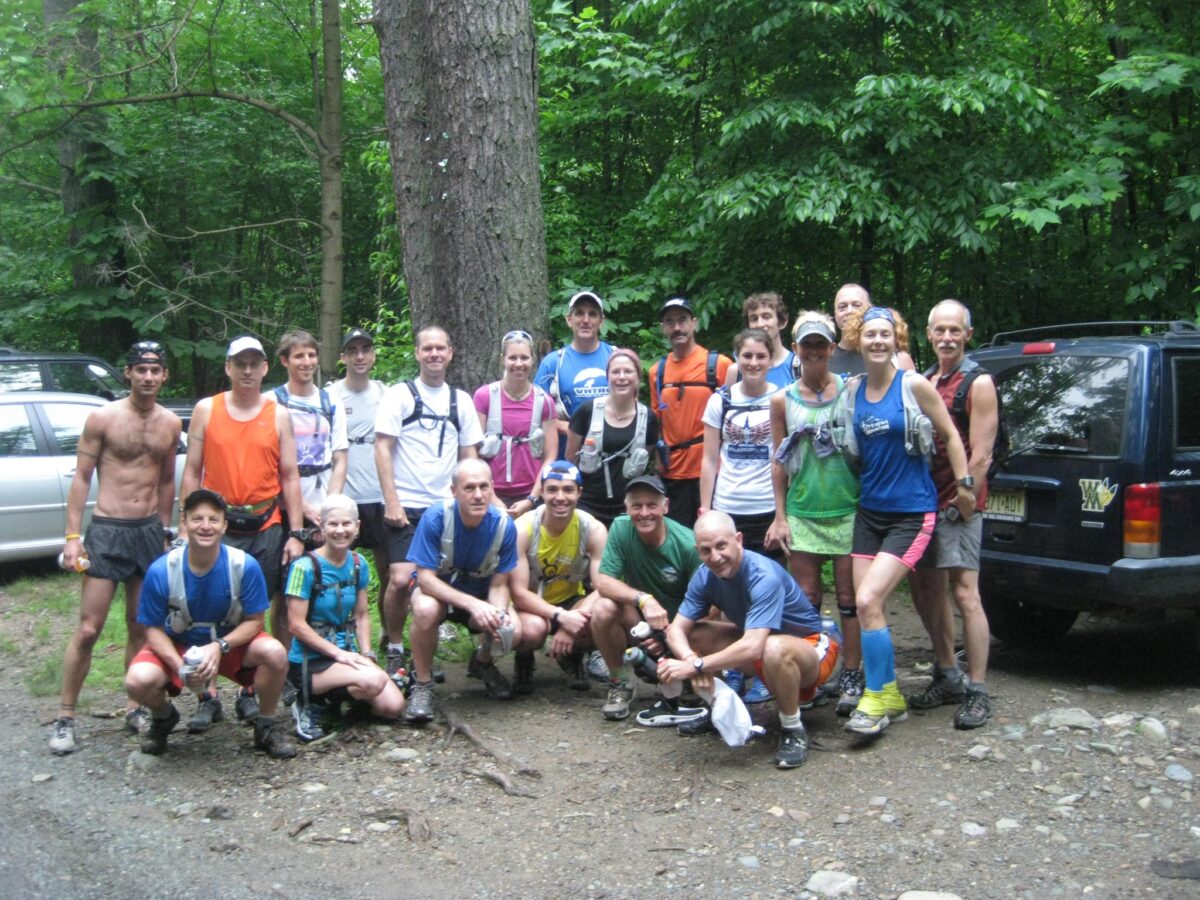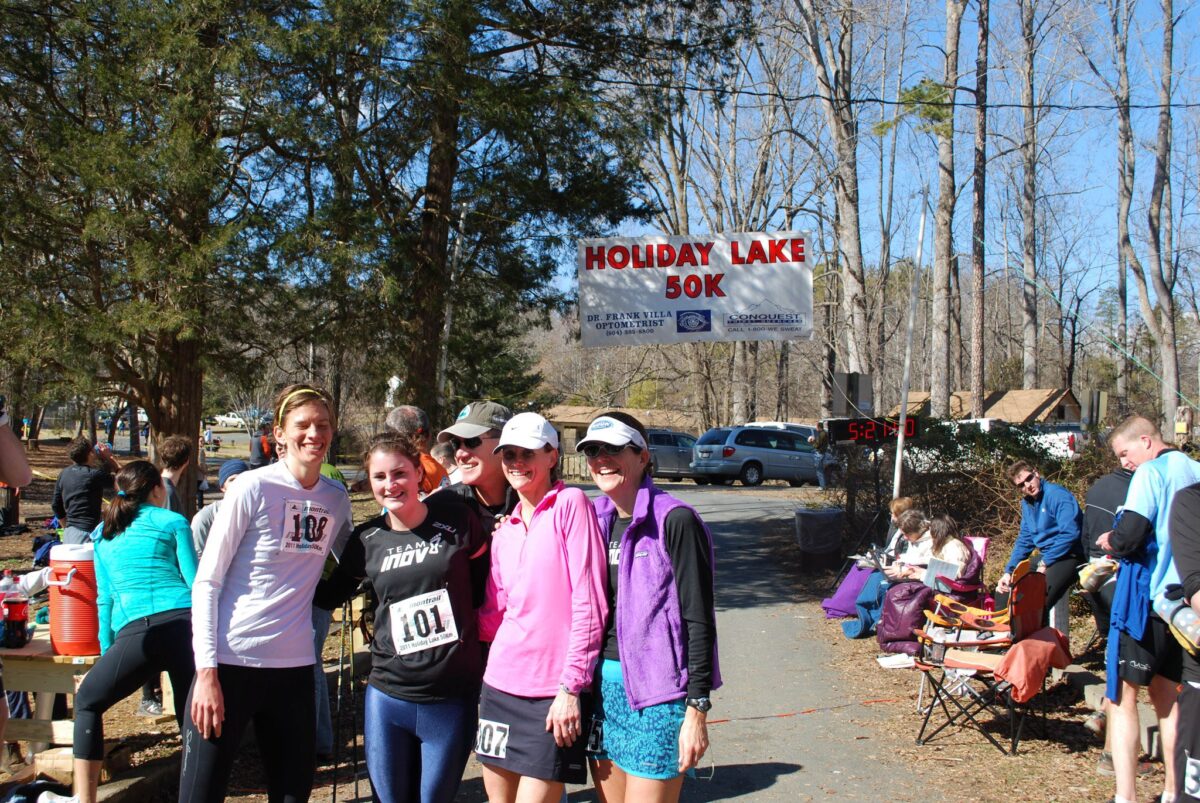After college, I lived in Washington, D.C., for a year. I was dabbling in trail running and ultrarunning at the time, and I was invited (repeatedly) to group runs in the mountains with the Virginia Happy Trails Running Club (the VHTRC). One Saturday in July, I woke up before dawn and drove to meet the group in the mountains. That morning on the trails, I ran through a sea… a C… a VHTRC of the friendliest faces, and I will never forget the warm reception they gave me. Everyone was so encouraging. They offered advice on training and racing. We ran hard together all morning, then gathered for a picnic. That afternoon, I drove home with the assurance that I had found my people.
From that point on, I saw my VHTRC friends a lot. I met VHTRC friends for lunch in the city. I ran with them after work in the evenings. VHTRC friends attended my wedding. It was one of the most hospitable groups I have ever been a part of, and I learned a lot from them about how to make people feel welcome. Since those days, I have discovered that hospitality and generosity of spirit characterize the ultrarunning community broadly, even beyond VHTRC.

Sabrina Little with the Virginia Happy Trails Running Club before a summer run. All photos courtesy of Sabrina Little.
The Concept
Hospitality is the disposition to receive or welcome others kindly (1). It involves the act or practice of embracing or receiving “guests, visitors, or strangers” with liberality and goodwill (2). The key is, hospitality is not a kind reception directed at one’s own, such as family and friends (or relations toward whom it is natural to extend favor), but toward those we don’t really know, or have just met (3). It is a generosity of spirit that precedes relationship. This is what makes it difficult. It is easier to extend kindness toward those in our own circles than it is to offer a warm reception to strangers.
Hospitality may seem like an odd concept to apply to running, since running does not often occasion opportunities to welcome others into our homes. But the disposition to receive others kindly, or to actively make space for one another, is a quality that, as I’ve said, has broadly characterized the ultrarunning community in my years of participation.
Moreover, hospitality is a quality that is fitting in the context of ultrarunning. Regarding the hospitality directed at travelers in Homer’s Odyssey, Leon Kass describes how the travelers are “exposed and unaccommodated… stripped of most of their own powers to provide for themselves (4).” In their travels, they are vulnerable, and they are sustained by the beneficence of strangers (5). I can’t think of a better description of the condition of the ultrarunner. Our sport positions us to be reliant on one another, and we are sustained by each other’s kindness through difficult miles over challenging terrain.
Hospitality’s Decline
I guess the irony of ultrarunning’s hospitality—the fact that we are quite welcoming—is that the sport is growing considerably. And with this growth comes the possibility of cultural change. I have noticed shifting tides in this respect, particularly as the sport becomes commercialized, more mainstream, and strained by incentives for performance over community. My hope is that ultrarunning maintains its welcoming character through this period of growth and transition. Below are some strategies for remaining as such.
Invite people.
This one is pretty obvious. Still, obvious or not, if I hadn’t been invited to group runs on multiple occasions, I would not have sought them out on my own. Joining new people is intimidating. So, invite people. Also, to clarify, this might mean you (sometimes) need to slow down. It is one thing to invite someone new to a group run. It is another thing entirely to accommodate that person if they show up. Sometimes being hospitable means meeting a person on their own terms, or at their own pace, even if that pace is slower than you may have run that day.
Don’t brag.
Bragging, in general, is distasteful. Bragging in the context of running can be a deterrent to people trying the sport for the first time. Often when I see bravado or self-congratulatory speech on social media, I think that, if I were not a runner and I saw this, I would probably not want to become a runner. Here’s why: Our sport can seem intimidating to non-runners, and to speak in grandiose terms about one’s accomplishments makes those feats seem unattainable. This is the goal of bragging, right? – to put oneself on a pedestal, to seem better than, or inimitable, and to incite awe in one’s peers? Well, these goals make running seems less inviting to prospective athletes. Let’s stop the bragging.
Tell more stories about the sport than just fast performances.
Fast running is exciting. We should definitely tell those stories, but we should tell other stories, too. For example, representation matters in our storytelling. I once had a student tell me she didn’t realize philosophy was for girls until she saw me teaching it. Historically, philosophy has consisted of male voices, taught by male teachers, and having me there made a difference in making the discipline seem like there was room for her, too. I think that an important part of hospitality in running is making sure difference is represented so that people see there is room for them in the sport.
Ultrarunning already does a great job of telling a wide array of stories about athletes in the front of the pack and athletes in the back of the pack. It tells stories about obstacles people have overcome, their different backgrounds, their families, occupations, and more. I want to commend this tendency and say I think we should keep doing this. It helps make running seem more welcoming to people from different backgrounds and with different abilities, rather than only runners who can win races.

Sabrina Little (#101) at the Holiday Lake 50k in Appomattox, Virginia.
Final Thoughts
Ultrarunning is a hospitality sport. Maybe this is because we spend a lot of time together in the elements, and this reinforces community reliance. Maybe the fact that we are all outsiders in a fringe sport motivates us to prioritize inclusion. Or maybe hospitality is natural to our sport because of the mutual respect for competitors that arises from shared efforts over difficult terrain. This is a special quality of ultrarunning, and I hope that as the sport grows, it remains welcoming and continues to prioritize community.
Call for Comments
- How have you experienced hospitality in the trail running and ultrarunning communities?
- Is there a special experience you remember extending hospitality to another ultrarunner?
References
- “Hospitality.” Oxford English Dictionary. Web. June 2021. Oxford University Press. https://www-oed-com.msu.idm.oclc.org/view/Entry/88721?redirectedFrom=hospitality (accessed July 02, 2021).
- Ibid.
- Leon Kass. 1999. The Hungry Soul: Eating and the Perfecting of Our Nature. University of Chicago Press, 100-101.
- Ibid 103.
- Ibid 103.
